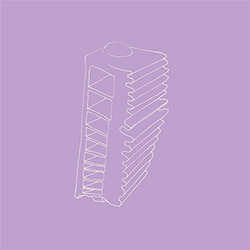
The harp is an instrument that conjures up a mythical past of angels, giants and fairies. It is also most frequently associated with traditional music from around the world or with its place in orchestral music, but Welsh harpist Rhodri Davies brings the harp to bear on contemporary music, stretching the vocabulary and practice techniques to include dramatically new sounds.
Performed on Telyn bedal (the Welsh name for the pedal harp) along with percussion, radio and tape recorder, the seven tracks recorded on three different dates in 2001 before an audience at All Angels, St. Michael and All Angels Church, West London serve to elucidate the state of the art of the harp. Track titles are non-existent; rather they are identified by dates, albeit not arranged chronologically: Mai/May 10, 2001; Tachwedd/November 22, 2001; Rhagfyr/December 7, 2001. (It should be noted that equal weight is given to the Welsh language on this release, as all info is provided in that language, as well as English.)
A trumpet-like blare opens the disc's cornucopia, but soon whale sounds come in, as Davies explores the lower register of the harp, the pedal register, literally speaking. Also, by means of percussive strokes alternated with swift bowing, the instrument's wide timbral palette is made clear and well-exploited, the only limits being the fertile imagination of this particular artist. And that's all in the first track! The rest of the album offers equally wondrous effusions of sound imaginatively processed by the hands of this improvising composer. Within his purview are industrial sounds (a vacuum cleaner, a mill saw, come to mind in spots) as well as the pinging and bouncing of pitches in rhythmic multifarious complexities resembling the piano and gamelan instruments. In pizzicato passages the entire range of orchestral string instruments are alluded to. While there is a marked presence of a machine-age sensibility, the search for the sounds that can be conveyed via the harp in imaginative and creative sequences, articulations and contours is at the core of the project. White noise, air or water flow sounds open the third track as the adventure continues, including more mechanical sounds, all created via the aforementioned implements.
Media theorist Marshall McLuhan said something to the effect that the environment of one age becomes the content of the art of the next one, and this principle is well-represented here, as all kinds of physical sounds from the industrial era, including 19th century orchestral contexts, are presented to an audience in an art space echoing (literally and figuratively) historical meaning (i.e., All Angels, St. Michael and All Angels Church, West London). A panoply of worldly sounds come within the scope of this composer's imagination, including the sounds of bells and chimes and the inflections of human language, with its gutturals, glottal and tongued sounds, garbled and gargled sounds, sounds of sorrow and joy.
The result is noise turned into high art! In an interview with Gorwel Owen1 Davies put it this way: "So often music is used as a vehicle for entertainment, hierarchies, self-promotion, competition, making money and so on, and is often fixed in a conservative value system. That has little to do with my understanding of music or sound. I'm interested in exploring and offering alternatives to these dominant modes of music-making."
In the same interview the harpist and composer also said: "Growing up, I was very dissatisfied with the standard harp repertoire, and I was looking for harp music that was relevant to a young person listening to John Coltrane, Ice-Cube, Albert Ayler, Anhrefn and Y Cyrff, rather than a music that was stuck in the nineteenth century. Improvisation was not encouraged at college; it was something I had to seek out independently. When I was invited to record the Navigation CD with Chris Burn's Ensemble, I remember thinking that I had learnt more in five days of rehearsal and recording with Ensemble, than I had in my entire music education."
Perhaps something equally enlightening can happen for listeners of Davies' explorations and discoveries via the pedal harp on this release.
1 Planet: The Welsh Internationalist, Issue 188, April/May 2008
Comments and Feedback:



More Recent Reviews, Articles, and Interviews @ The Squid's Ear...


|

